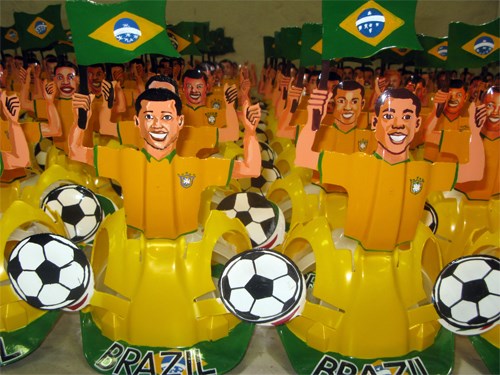Ayoba! Decoding the South African football fan

Makarapas – South African football fans' elaborate and colourful helmets – manufactured in a factory in Newtown, Johannesburg. Photo: Ndaba Dlamini, MediaClubSouthAfrica.com
18.05.2010
By Miko SchneiderThere are many local customs and cultural artefacts that distinguish the South African football fan – here is a quick guide to a few of these symbols, their history and meaning.
The vuvuzela
This elongated, brightly coloured plastic horn caused controversy during the run-up to the tournament, with rumours that FIFA wanted to place on a ban on the high-volume instruments after television producers complained that the noise overpowered their commentary. However, FIFA boss Sepp Blatter agreed with vuvuzela supporters who maintain that the horns are an integral part of football culture in South Africa. Although they are blown in an uncoordinated fashion during matches, a vuvuzela orchestra was formed in 2006 by musician Pedro Espi-Sanchez, who was impressed by the instrument’s ability to create beautiful rhythms when played together with others.
The origin of the name is not entirely clear, but the word “vuvu” echoes the deep sound that emits from the instrument. The horns are now massed-produced in a variety of colours and widely sold around the country, although it is not advised to purchase one if you have little patience for noise that resembles an elephant trumpeting, or a little bit of ringing in your ears.
The makarapa
Along with the vuvuzela, the die-hard soccer fan wears a modified miner’s hardhat, called the makarapa (or makaraba). What starts off as merely a plastic helmet becomes an artistic hand-cut sculpture once the makarapa designer has adorned it with team logos and colours, players’ faces, personal branding, and various totem-like appendages.
A number of sources site the origin of the hat as dating back to 1979, when Alfred Baloyi crafted the first makarapa in Johannesburg to protect the heads of supporters at a match in Soweto between two local teams, who faced flying glass bottles from opposing fans. The word is a colloquial term for a migrant worker, and refers to those men who wore the hardhats while working on the mines. Baloyi says that the term is also slang from his hometown for someone who has ‘made it big’ in the city – just like Baloyi himself.
This headpiece can certainly annoy fans sitting behind the wearer, so the best possible solution to this problem would be to join the fun by creating or purchasing one for yourself. They are available as hand-painted works of art from informal street traders, or mass produced and sold online, to be ‘pimped’ with adhesive national team colours and logos, or bent by slightly heating the plastic. Even inflatable and child-size makarapas can be found.
The Diski
South Africans are known for their rhythm, which formed the basis of a marketing campaign by South African Tourism head of the tournament. An advertisement aired on major international news channels and spread through viral marketing online, where dancers are seen performing a combination of five basic steps derived from local-style football moves. ‘Diski’ is township slang for ‘football’, and is being touted as the ‘official line dance’ of the 2010 World Cup.
According to the SA Tourism website, the steps include “the Juggle or Teka (juggling the ball from left to right), the Header (bouncing the ball on the head), Table Mountain (flattening the back to keep the ball behind the head), Trepa (a word used to describe flicking the ball from behind the neck, over the head and onto the foot) and the Bridge or Brija (passing the ball over the left foot with the right foot and back again)”.
The Bafana Bafana team, school children, the elderly, politicians and all sorts of people are feeling the dance’s contagious beat. Forget disco dancing, in 2010 South African rhythm means Diski dancing - while wearing your makarapa and blowing your vuvuzela of course.





